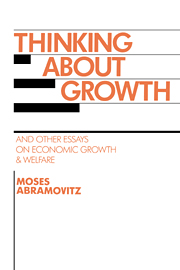Book contents
- Frontmatter
- Contents
- Editors' preface
- Preface
- Part I Growth and the economists
- Part II Studies in long-term growth
- 3 Resource and output trends in the United States since 1870
- 4 Economic growth in the United States: a review article
- 5 Manpower, capital, and technology
- 6 Rapid growth potential and its realization: the experience of capitalist economies in the postwar period
- 7 Catching up, forging ahead, and falling behind
- Part III Long swings in economic growth
- Part IV Growth and welfare
6 - Rapid growth potential and its realization: the experience of capitalist economies in the postwar period
Published online by Cambridge University Press: 22 March 2010
- Frontmatter
- Contents
- Editors' preface
- Preface
- Part I Growth and the economists
- Part II Studies in long-term growth
- 3 Resource and output trends in the United States since 1870
- 4 Economic growth in the United States: a review article
- 5 Manpower, capital, and technology
- 6 Rapid growth potential and its realization: the experience of capitalist economies in the postwar period
- 7 Catching up, forging ahead, and falling behind
- Part III Long swings in economic growth
- Part IV Growth and welfare
Summary
Dramatic statements about the remarkable growth of the industrialised market economies are by now superfluous. The forces which account for this notable experience, however, still challenge explanation. And without a well-tested explanation, we are in a poor position to say whether rapid growth has now come to an end or whether it is likely to be resumed. Equally, we are in a poor position to suggest what policies might regenerate and sustain rapid growth were that an agreed aim of public policy.
Although, as said, we do not as yet have a well-tested explanation, a good deal of ground has been cleared, and the elements of a general understanding of the causes of rapid growth have begun to come into view. This being the case, I think it will be useful to try to draw these together as well as I can. This may help us discover how much agreement there is about the factors underlying postwar growth. And it may help us see where the empirical basis of our theories is especially weak and where, therefore, future work ought to be directed.
Both the breadth of this assignment and the limits of my own competence require that I restrict attention to the experience of the industrialised market economies as a group, and, correspondingly, to the common causes which I see behind it. A general view of this experience should help us understand the differences among countries in their rates of growth, in so far as those differences have a systematic character.
- Type
- Chapter
- Information
- Thinking about GrowthAnd Other Essays on Economic Growth and Welfare, pp. 187 - 219Publisher: Cambridge University PressPrint publication year: 1989
- 7
- Cited by



